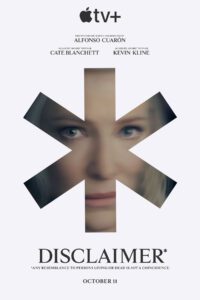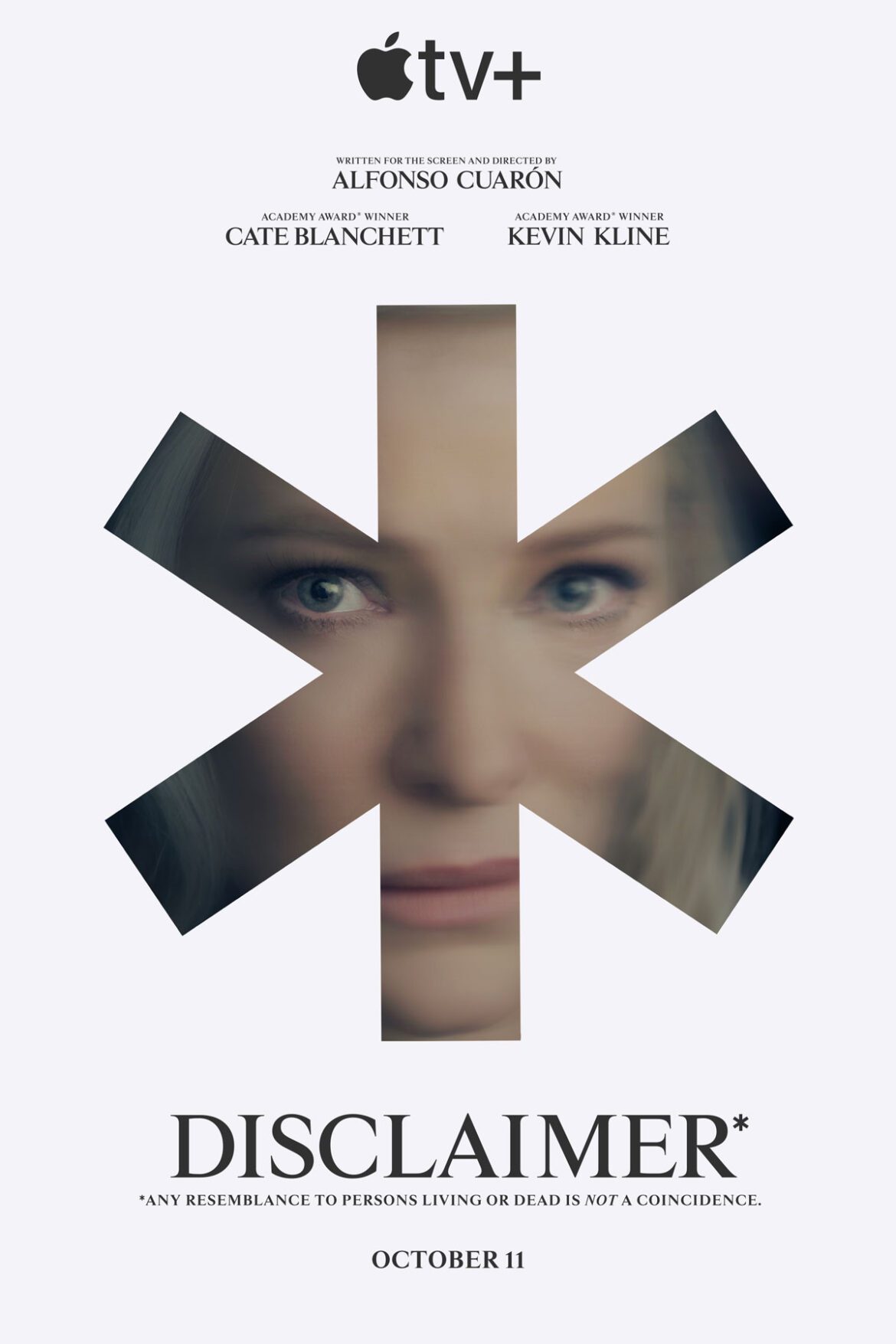
Service: Apple TV+
Series Year: 2024
Watch: Apple TV+
This series is like one of those GIFs that frustratingly loops right before the climax of whatever is going on in the moving image. You sit there watching it head toward its inevitable flop or crash or whatever, but you just never get there. The guy just restarts walking on those obviously icy stairs or the plane with the floppy wing plummets toward the ground once again, never to reach its final catastrophe. Such is the weird looping, completely unsatisfying feeling of Alfonso Cuarón’s Disclaimer. A show which, weirdly, starts every episode with an actual disclaimer of sorts: “This series contains strong sexual content and depictions of sexual, physical, and emotional violence.” But you watch episode one and there is nothing. Same goes for episodes two through six. Which leads to a pretty clear place where we’re going with the seventh and final episode. The disclaimer spoils Disclaimer. Is it some sort of meta joke? Or is it just a quirk of our modern trigger laws? We’ll never know.
But back to that whole looping thing. The entirety of Disclaimer feels as if we’re working toward something. A story about grief (what story isn’t these days) and loss (also a big theme) and the stories we tell ourselves to help quell that grief and loss. Even if those stories are myopic and self-serving. To capture the version of the person we hoped and wished a person was, and shield ourselves from anything and everything that might dent that vision of them. A hagiography. Such is the point of one Nancy Brigstocke (Lesley Manville) and her dead son, Jonathan (Louis Partridge). A young man who drowned off a beach in Italy trying to save a random boy from rough seas. To deal with the loss of her son twenty years earlier, and with a recent terminal cancer diagnosis, Nancy locks herself away in Jonathan’s old room and, based on some of Jonathan’s photos from his trip and some amateur sleuthing, writes a fan fic of her son’s erotic adventures with an older woman he met on that Italian beach and who she ultimately blames for his drowning death a couple days later. She prints one copy of the manuscript, puts the thing in a drawer and succumbs to her cancer. Eventually, after Nancy’s death, her husband, Stephen (Kevin Kline), wanders into the shrine to his dead son and finds Nancy’s book. Along with the photos that inspired the version of the tale she spun for herself.
Stephen — played by Kline with a what has to be a very odd-sounding British accent to natives of that country — decides for reasons I still can’t quite suss out to bring the book to his publisher friend, pose as its author and eventually self-publish the thing in some sort of demented attempt to get retribution against the aforementioned older woman, Catherine Ravenscroft (Cate Blanchett), whom he comes to believe is the both the subject of his son’s affection and the woman in the erotic-seeming photos he took of her. It’s never made entirely clear what has broken Stephen’s brain to the point he essentially becomes a mad stalker and evil mastermind trying to destroy Catherine’s personal and professional life by building paranoia and insecurity in her husband, Robert (Sacha Baron Cohen), somehow driving her son, Nicholas (Kodi Smit-McPhee), to become a heroin addict and essentially turning everyone in Catherine’s entire life against her. Including her adoring staff at her documentary film company, who Cuarón clumsily turns into some sort of weird Gen-Z, woke cancel mob. They’re sent this book of what could be total fiction — which doesn’t mention Catherine by name — took place twenty years prior and just basically paints her as a cruel-ish cheater who blows off a young suitor after he becomes overly attached and essentially watches him drown after he attempts to save her son. Not a murderer, mind you… But her staff, who think she walks on water once second, get some small sense of the book, think it’s her and all of a sudden want to oust her from her own company and claim battery after she tries to get some young punk in her office off of her after her grabs her arm. It’s completely absurd.
And for six episodes this is the show. Stephen psychotically unwinds her life and she just kind of takes it. None of it makes sense. But always in the back of your mind is that content warning / disclaimer at the front of every episode. And you know the turn is coming. Because the whole series through episode six shows these past events from the perspective of the book’s narrative. A book we know can’t be entirely accurate. What we do know is that this person playing Catherine twenty years ago (Leila George) is supposed to be the same person as older Catherine (despite the two actresses looking absolutely nothing alike), so we know there is someone currently in the world who knows the real story of what happened. A story that Catherine, for some stupid reason, refuses to tell both her husband, her son and her colleagues, all of whom have turned on her and think she’s the awful woman depicted in this work of fiction. In fact, she doesn’t even tell us, the audience, the truth. So we’re forced into this speculative fiction version from Nancy. It’s kind of a hacky way to box us in. We know it’s not real, but the one person who can validate our feelings just won’t comment on it at all. But in some ways we don’t need her to because of that that damn content warning… And then it comes. Episode seven, we finally get the turn. But, again, it’s clumsy. It’s the loop on the GIF. It’s the feeling we need closure on the original POV from Nancy and why she decided this would be her story, but instead we get the 30 minute data dump from Catherine, which unwinds the thing we knew was probably not the thing for the first 270 or so minutes of the show. The frustrating loop back to the beginning and the stump on the end that doesn’t show the dude falling on his ass on the ice.
Thing is, the show looks good. But some of the choices — including a voiceover that I think was supposed to add some literary bent, but is more distracting than anything else — were confounding for a pro like Cuarón to make. In the end, why is Stephen — who has worn Nancy’s ratty old cardigan the entire series to be closer to her — mad at Nancy? She put the book in a drawer. It was her catharsis writing that book and choosing to paint her son as a hero and a victim. Her way of taking his memory with her to the grave in a way that she wanted. It was never intended for Stephen to find it, let alone publish it and play vigilante with the person she perceived as his son’s killer by indifference. While I enjoyed Kline’s portrayal of this schlubby retired professor in his bathrobes and mussed hair, the whole thing with him felt over-the-top goofy in places and kind of eyebrow raising in others. There are just so many plot holes and so many scenes where I found myself muttering “that would never happen” that I can’t help but wonder if either people were afraid to give Cuarón notes, or perhaps the sheer runtime of seven 45-minute episodes got away from him. Or maybe continuity and realism just aren’t things he cares about. The sheer number of times Catherine is put in a position where she could just say two words to save a critical situation, but for some reason remains mute, is in and of itself one of the more frustrating oversights in the show. “Oh, that man who just came in to visit my son in the hospital that you just saw me assault, who also claims to be my father? Not my father — he’s a guy who is blackmailing me and maybe, possibly trying to murder my son.” Nope, she just doesn’t say anything. Until we get the 30 minutes of exposition. Where was that the whole time, Catherine?
And the whole Leila George / Cate Blanchett transition. Sure, they’re both blonde. And it’s forgivable that in Nancy’s telling of the story — and the visuals connected to that — she looked like George. Ish. But then in Catherine’s telling, she still looks like George… THAT would have been cool if in her telling, she was a de-aged Blanchett. Or at least someone who resembled her enough that it was believable. But in her own reality she looked like George as well? I know we have Jonathan’s photos, so there is photographic evidence of what Catherine looked like 20 years ago, but the cognitive dissonance there is real. He gets into a real pickle when he has to show a time between the younger George and the older Blanchett. Do we age up George or de-age Blanchett? Instead he just kind of changes Blanchett’s hair and calls it a day. Was it the nudity? Was it something else? Or was it just Cuarón hoping we’d just buy it and move on? The real star of the show is actually Catherine’s cat, who seems to constantly wander into scenes and cause weird chaos. Something that was apparently an intentional director tactic to try to introduce some obstacles to Blanchett’s exacting blocking and manner. She seemingly handled it like a real pro. Because she is. As is the whole production, honestly. But it’s sloppy art nonetheless, with a muddled message that is somewhere between the case for self preservation and the fact we should “trust women.” Ultimately, I don’t know what the point was, but it was an infinitely intriguing and frustrating journey.


